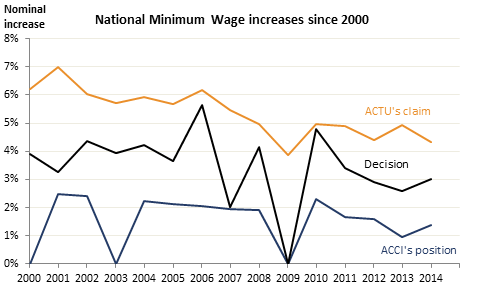Should we just freeze the debate on the minimum wage?
Australia’s process to set the minimum wage could best be described as a brutal, polarising economic battle royale. But are the rules of engagement due for a change?
In a war of words, numbers, and PDF submissions, unions, industry heavyweights and interest groups face off each year over changes to the wage of Australia’s lowest paid workers.
In one corner, we have the unions, spearheaded by the Australian Council of Trade Unions. As you can guess, the ACTU always tries to push for the largest increase to the minimum wage, usually around the $30 per week mark.
The ACTU’s arch enemy is the Australian Chamber of Commerce and Industry, a group that represents the interest of employers and typically pushes for a $10 or less increase to the minimum wage. Some years they’ve recommended that it not be raised at all.
In the middle of this sits an umpire. In this latest rendition of the laws, it’s a panel of experts commissioned by Fair Work Australia to evaluate all of the submissions.
This group hears all the submissions, looks at the government’s budget forward estimates and economic reasoning and a month later makes a final call as to how the wage will be changed for that year. It usually comes into effect each July. More often than not, the decision falls somewhere between the ACTU’s and the ACCI’s recommendations. They then both complain to the press about the decision, and then around March the next year they file new submissions and the process starts all over again.
While the name of mediating group in the debate has changed a couple of times over the past decade, the role has essentially remained the same. But now, that may be about to change.
Treasurer Joe Hockey yesterday said that the latest decision to lift the minimum wage by $18.70 per week will undermine the government’s agenda to boost productivity and create more jobs.
His comments compound recommendations from the Commission of Audit that the government standardise the minimum wage to grow within one per cent of CPI for the next 10 years. If the decision is standardised, it will likely abolish the need for submissions or an inquiry. If it’s introduced, it will likely form part of any industrial relations reforms the government puts before parliament.
So, in anticipation of this debate, Business Spectator decided to take a look at the system being used to determine the minimum wage. Despite two major reforms of the system over in recent years, it’s always been tied to the idea of an annual inquiry. So we wanted to determine whether this process is fair to both parties.
We looked back at the ACTU and the ACCI’s recommendations and the umpire’s decisions over the past decade. You can see our results in the interactive chart below.
Looking at which recommendation was closest to the end result over the past decade, we found that it’s a perfect 50-50 split between the two parties. Some years the umpire erred closer towards ACCI’s recommendations, others it drifted towards the ACTU. Again, this is despite two major reforms of the system over this period.
Some of ACCI’s recommendations over the years threw off this calculation. For instance, in light of a new system being introduced in 2006, ACCI decided that it would not offer a dollar figure recommendation. It followed through with this in 2007, but rethought its approach in more recent submissions. Also, in 2009 -- in light of the GFC -- the ACCI recommended no change to the wage. That year, the umpire agreed.
So, to dig a bit deeper, we put the question to the two groups. They argue that the decision isn’t fair every year, that it doesn’t side with them, but does their opinion change when looking at the process over a substantial period of time?
The ACCI and the ACTU both agree that the process can be improved. Though, the ACTU is happier with the current system than the ACCI.
Chief operating officer for the ACCI, John Osborn, warns that a decade overview may not be the best indicator of fairness.
“You need to be careful you’re not comparing apples with oranges,” he said.
“The system changed dramatically during that time from the Australian Fair Pay Commission to what is now the Fair Work Commission.”
“What we have seen most recently is a series of decisions that are far in excess of what business has warned employers can bear and beyond that will negatively impact on jobs.”
Surprise, surprise, the ACTU disagrees.
“The process under the Fair Work Commission is certainly fairer than the process under the Australian Fair Pay Commission that was in place from 2006 to 2009,” ACTU secretary Dave Oliver said.
“These include economic criteria, like productivity growth and profitability, but also relative living standards and the needs of the low paid. The current process is also more transparent, with open, public consultations and a chance for interested parties to respond to one another’s submissions.”
The ACTU also provided Business Spectator with this graph, which seems to indicate that in more recent years the decision from the umpire has largely fallen in the middle of the two parties’ suggestions.

Source: ACTU
So while we can’t come to an empirical conclusion as to whether the system is fair, one point is certain: you can’t say that the current system isn’t democratic.
Perhaps the most dangerous point about tying the minimum wage to CPI is that it also consequentially freezes the annual debate on the topic and stops the decision that gives it airtime in the public sphere every year.
One can only hope that the government at least considers this point while treading deeper into IR reform.
Putting politics and agendas aside, the public discourse and discussion about the minimum wage in Australia ultimately matters more than any annual dollar increase.
Got a question? Let us know in the comments below or contact the reporter @HarrisonPolites on Twitter.
















